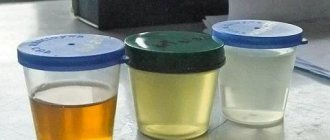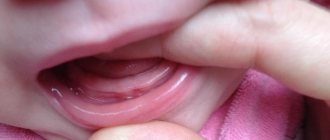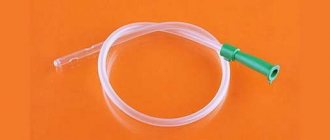After the birth of a child, parents experience great anxiety about his condition; colic, lack of milk, and many other problems of newborns can be especially cause for concern.
In the first months of life, infants begin to suffer from many problems associated with the digestive process. This happens because the digestive system is still poorly formed. This is why painful colic very often occurs, increased gas formation is observed, and the baby’s stomach rumbles. During these disorders, the child suffers greatly, sleeps poorly, eats poorly, and cries all the time. It is very important to know why a baby’s stomach growls, when it is considered normal, and how to help the baby.
Causes of rumbling stomach in a child
To understand why a baby’s stomach is rumbling, you need to know the main reasons that can provoke such a condition. The most common cause is swallowing air during feeding. This happens due to improper attachment of the baby to the breast or due to the fact that the milk flows very strongly and the baby simply does not have time to swallow it. In addition, the baby's tummy may growl due to the accumulation of gases in the intestines. Accumulation of gases can occur:
- if the mother consumes foods that increase gas formation;
- if there is not enough fluid in the newborn’s body;
- if there is lactase deficiency.
If a newborn has dysbacteriosis, this means that the composition of the intestinal microflora is disturbed.
When breastfeeding, a woman needs to adhere to a certain diet, avoid sweet, fatty, salty and smoked foods. In addition, rumbling in the stomach can be caused by incorrectly selected or prepared formula for breastfeeding. Many young mothers are interested in why their baby’s stomach growls and bloating occurs. This can happen due to the fact that the baby has eaten a lot, and his digestive system simply does not have time to digest the food, which causes fermentation processes. If a baby's stomach growls during feeding, then in most cases this is considered normal. And if the rumbling begins only half an hour or more after satiety, and is also accompanied by other disturbances, then this may indicate problems with digestion. To determine the presence of pathology, you need to take into account factors such as:
- time of rumbling appearance;
- is this process accompanied by gases;
- are there any bowel irregularities;
- whether the child suffers from colic;
- Does your appetite decrease?
Violations can occur for a variety of reasons, which is why it is necessary to consult a doctor and carry out comprehensive treatment.
Possible reasons
Why do young children have similar tummy problems? Most often, the reason for this is one of these phenomena.
Peristalsis
Immediately after feeding, the child’s body becomes more active and begins the active phase of digestion. As a result, intestinal motility increases, which provokes rumbling and sometimes causes quite unpleasant sensations for the baby.
Changing your diet
If initially the child fed exclusively on mother's milk, after changing the type of food, some changes occur in the digestive processes. It is somewhat more difficult for a baby to digest artificial formulas, since they contain cow and goat milk, and more enzymes and energy are needed to process and assimilate it. It is not so easy for very young children to cope with such a task.
Lactose
This substance is found in all natural dairy products that are fed to newborn babies. After the substance, which is essentially milk sugar, enters the digestive system, a special enzyme begins to be produced aimed at processing it. This enzyme is called lactase.
Sometimes its synthesis is disrupted, which is a completely natural process in the early stages of a baby’s life. Over time, these processes will improve, and by 3-4 months the child will get rid of the problem of insufficient synthesis of digestive enzymes. Although sometimes such violations can get worse. In this case, they talk about lactase deficiency. Children with this disorder need to choose a special diet and adhere to its principles in the future if the situation does not improve.
Colic
Due to the imperfection of the digestive system, as well as due to the swallowing of air, babies have a seething stomach during feeding. This reason is one of the most common. Colic occurs soon after feeding. Gases accumulate in the baby's intestines, which put pressure on the abdominal wall and cause very unpleasant sensations.
Microflora
We recommend reading: How to treat colic in a newborn?
In the first months, the baby's intestinal microflora is just beginning to form. During this period, the completely sterile digestive system is gradually populated by microorganisms. These are, first of all, beneficial bifidobacteria and lactobacilli, as well as bacilli, streptococci and other opportunistic bacteria. If the amount of the latter exceeds the norm, the baby’s tummy growls and side symptoms occur. This could be ordinary dysbacteriosis or a more serious infection with subsequent inflammatory processes. To avoid complications, you need to identify the problem in time through testing.
Only after a visit to the pediatrician can you more or less accurately determine the cause of the violent reaction of the digestive system and prescribe appropriate treatment.
Rumbling due to hunger
If a baby's stomach growls loudly, it may be due to hunger. If a child wants to eat, the stomach begins to secrete juice, the digestive tract requires adequate nutrition, and as a result, a rumbling sound appears.
To get rid of this condition, you need to feed the child. It is important to remember that breast milk is considered the best and healthiest food for a baby. If it is not possible to normalize lactation, then it is important to choose the best adapted formula for the baby. In addition to the strong rumbling, the child’s hunger is indicated by his piercing and demanding loud cry.
First aid
In order to influence the cause of strong rumbling that causes discomfort to the child, it is necessary to correctly identify it. To do this, you should consult a doctor. This is the only way to get up-to-date advice and the right methods to eliminate poor health.
Doctors usually call colic the cause of rumbling. In this case, the first aid will be to apply a warm cloth to the baby's stomach, but it should not be hot. To do this, just iron it with an iron. The fabric chosen is only cotton. Then the baby's legs are pressed to the chest.
The occurrence of colic
If a baby's stomach rumbles after feeding, this may be due to increased gas formation and colic. Basically, this condition is observed in the baby for 2 months after birth. After this time, colic goes away in most children. However, some children may suffer from this disorder for 6 months.
Colic in a child can occur for a variety of reasons. Immediately after the birth of a child, his intestines are completely sterile and contain absolutely no bacteria. With the first meal, dairy products enter his body, helping to normalize the intestinal microflora. Since the body does not yet contain beneficial bacteria, fermentation can increase significantly, and as a result, bloating occurs. Treatment for this condition is not required, you just need to wait a while until the intestines begin to work normally.
Main reasons
In addition to age-related changes in the body and the active restructuring of the baby’s digestive system, there are many other reasons why a newborn’s stomach rages during feeding.
One of the reasons for stomach turmoil is a restructuring of the digestive system.
Lactase deficiency
Lactase deficiency is one of the common causes of stomach turmoil.
Lactose is milk sugar found in milk, including breast milk. To break down this substance, another element is released in the body - lactase. Infants have too much of this substance in their bodies, which causes side effects. Due to the constant feeding of milk, this enzyme does not have time to be fully produced, and this is expressed by a seething stomach and colic.
Lactose is the milk sugar found in breast milk.
You should not overfeed your child - perhaps the reason for crying is not the desire to eat, but to drink.
Overheat
Overheating can also cause your stomach to churn.
If the child overheats, increased gas formation occurs, and more food in excess of the norm only aggravates the situation.
In case of overheating, the child experiences increased gas formation.
Wrong menu for a nursing mother
Improper construction of the daily menu of a nursing mother can also cause turmoil in the newborn.
Lactase deficiency
If a baby's stomach is rumbling, this may be one of the manifestations of lactase deficiency. In the first months of life, a newborn eats exclusively dairy foods containing lactose. It contains enzymes that help digest food. If these enzymes are not enough in the body, then the baby’s tummy will make a rather strange rumbling sound. In addition, the baby may have too liquid or green stool; while eating, he may abruptly drop his chest, cry, or tuck his legs.
To determine the presence of lactase deficiency, you need to undergo an examination and take urine and stool tests. If the diagnosis is confirmed, the doctor recommends changing the newborn’s diet. Today, there are special adapted milk formulas designed for such children.
Enzyme deficiency
If a baby's stomach is rumbling, this may be due to a lack of enzymes in the body. Typically, this condition is observed in babies under 2 months of age and appears during the introduction of complementary foods. For normal digestion, the human body must secrete certain enzymes. If the body lacks certain substances, then the food is not digested, but enters the intestines unchanged. As a result, fermentation begins and the amount of gases increases.
Enzyme deficiency can be corrected very easily. There are certain drugs to replenish the lack of substances. However, they should only be prescribed by an experienced specialist after a comprehensive examination.
What to do
There are various reasons by which you can find out why your baby’s tummy is rumbling. In each case, treatment is prescribed or measures are taken.
- Feeding. The mother needs to maintain a balanced diet. It is better to immediately determine the regimen and indicate the dose of milk. The baby should receive both anterior and posterior nutrition. If artificial feeding, you should look carefully at the composition of the formula - the child should absorb it well.
- Disturbed microflora. In case of dysbacteriosis, you must visit a doctor and get tested. One of them is bacterial culture: it helps to identify disorders in the digestive system, after which the child is prescribed probiotics. If an infection is found in the body, it is eliminated with the help of medications. To prevent infection, you need to monitor not only the diet, but also the baby’s hygiene.
- Colic is the most common cause. If the tummy is rumbling precisely because of this, you need to give the baby dill solution. There are other natural-based children's preparations that are sold in pharmacies and help get rid of fermentation. The baby can do light exercises - cycling or simply lifting the legs and stretching the baby. It is necessary to ensure that no air gets into the stomach. If colic does begin, the baby is stroked on the tummy.
- Lactose. If this is the case, it is necessary to adjust the newborn’s diet. It will be better if there is no lactose in the food at all.
Before treating or eliminating the problem, it is better to consult a pediatrician, since there is a risk of more harm to the child.
Therapeutic and preventive measures are carried out only under the supervision of a doctor. Sometimes it's all a matter of age, and over time the bubbling and rumbling will stop. To eliminate the baby’s discomfort, you need to pick him up, turn him over more often and massage his tummy.
Rumbling due to dysbiosis
If a baby's stomach growls when feeding, this may be due to dysbacteriosis, and the stool may become foamy and loose. This condition occurs due to a violation of the microflora in the intestines. In addition, the digestive tract is normally populated with beneficial microorganisms. If pathological microflora actively develops, then dysbacteriosis may occur.
Doctors usually take stool for testing before prescribing a particular drug. Only after confirmation of the diagnosis are medications prescribed that normalize the intestinal microflora.
Symptoms
During the period of gas formation and bloating, the disease is accompanied by accompanying symptoms:
- pain in the abdominal area;
- sleep disturbance;
- whims and crying;
- refusal to eat;
- pressing the legs to the stomach;
- loose green stools;
- bloating and gas formation.
The above signs are acceptable in the process of formation of the microflora of a newborn. But to control the situation, you should consult a doctor for examination.
Main symptoms and signs
It is quite easy to determine whether a child has a problem, since the baby’s stomach often rumbles immediately after feeding. In this case, distinct sounds appear, especially if you place your palm on the baby’s tummy. In addition, along with the rumbling, other quite characteristic signs appear, in particular, such as:
- discomfort and pain;
- moodiness;
- worsening sleep;
- feeding problems;
- cry;
- tucking up the legs;
- bloating;
- the stool becomes watery.
Based on all these signs, after a comprehensive examination, it is possible to determine the exact cause of such violations. That is why it is important to consult a doctor in a timely manner for a diagnosis.
Prevention measures
To save a newborn from a painful condition, you need to know and follow a number of simple rules.
Ways to prevent bubbling and bloating in a baby:
- It is correct to breastfeed your baby. You can consult a breastfeeding specialist about this.
- If the baby is bottle-fed, make sure that the nipple is firm and the hole in it is small.
- Hold the baby upright after feeding.
- Turn the baby onto his tummy 3-4 times a day. This helps strengthen muscles and facilitate the passage of gas.
- Massage, apply a diaper heated with an iron to the baby’s belly.
- Monitor the diet of a nursing mother. Use medications and antibiotics only as prescribed by a doctor.
Compliance with all these rules will help to avoid fussing and pain in the baby, his condition will improve, and the baby will become calmer.
First aid for rumbling stomach
It is important to understand not only why a baby’s stomach growls during and after feeding, but also how to help him cope with this problem. A heat compress can be used to relieve and eliminate colic. To do this, soft fabric is heated with an iron, applied to the tummy, and then the baby’s legs are pressed to the chest. The procedure helps the child calm down and fall asleep.
The child should often be placed on his tummy, special gymnastics should be done with him, and he should walk around the room with the baby in his arms, where there should be dim lighting and soothing music, which has a good effect on the nervous system. In the evening, you can give your baby a small massage on the back or tummy with light massaging movements in a clockwise direction, without pressing too hard. Movements in the navel area should be especially careful.
It is also recommended to rhythmically bend and straighten the legs, as this helps food pass into the small intestine much faster. If all these remedies do not help, then you can prepare dill water or chamomile infusion for your child. In exceptional cases, use a gas outlet tube.
How to eliminate rumbling
This condition in newborns can be corrected with the help of medications, massage, and folk remedies. Often a simple massage is enough.
Taking medications
If the cause of rumbling is excessive gas formation, children are given Espumisan, Bobotik, Plantex. These medications can reduce gas formation and naturally and painlessly remove air trapped in the intestines.
For dysbiosis, probiotics and prebiotics are prescribed: Bifiform Baby, Linex, Biovestin. They restore healthy intestinal microflora. After taking these medications, the child’s condition returns to normal.
For children, especially infants, any medication is given only as prescribed by a pediatrician.
Massage
Abdominal massage has long been used to eliminate rumbling and bloating in infants. It helps ease the passage of gases from the intestines.
Do it with a warm hand 20-30 minutes after feeding. Using stroking movements in a circle, gently and easily massage the baby's tummy clockwise for 5-10 minutes.
Afterwards, lightly press the baby’s legs bent at the knees to his stomach several times.
After these manipulations, gases begin to pass, the rumbling stops, and the newborn feels better.
Traditional medicine
Dill water helps with boiling. Until recently, it was the only treatment for colic in infants. You can buy it at a pharmacy kiosk .
The packaging indicates the composition and exact dosage of the medicine.
It is necessary to monitor the baby’s well-being when the product is used for the first time. It is rare, but there is an allergy to dill seed oil.
Applying a heated diaper to the baby's stomach allows you to get rid of gas, colic and rumbling will go away.
How to properly prepare dill water
To relieve colic and eliminate excessive gas formation, you can prepare dill water for your child or purchase ready-made water at the pharmacy. To prepare dill water, you need to take a teaspoon of crushed fennel seeds, put them in a glass jar, pour boiling water over them and simmer a little for 20 minutes in a water bath. You can also make dill tea from fresh herbs, which must be finely chopped and pour half a glass of boiling water. You need to steep the tea for an hour.
Treatment methods
To make the baby feel better, apply a warm compress to the stomach. To do this, you can heat a soft cloth with an iron. Place the child on the stomach and press his legs towards the chest. The baby will calm down and fall asleep. It is allowed to turn the newborn over onto his stomach. Therapeutic exercises are performed, as well as back and abdominal massage. Particular care should be taken to stroke the navel area. Rhythmic flexion and extension of the legs helps natural digestion while the pain subsides. Dill water or chamomile infusion is recommended as medicine. In extreme cases, it is necessary to use a special gas outlet tube.
To prevent bloating, you need to ensure proper feeding. If necessary, use a special anti-colic bottle with a nipple. After eating, the baby should be kept in an upright position for some time. Use boiled water for drinking. If deviations have been diagnosed, then you must follow the doctor’s recommendations and strictly adhere to the prescribed therapy.
Your home medicine cabinet should always contain medications that alleviate the baby’s condition. If necessary, you should seek help from your pediatrician.
Carrying out treatment
Every mother wonders if her baby’s stomach is rumbling, what to do. If such a condition occurs quite often, then you should definitely visit a doctor who will conduct an examination and prescribe treatment in accordance with the existing disorder.
If rumbling occurs due to problems with feeding, then it is necessary to adjust the dose and regimen. It is best to give food often, but in small portions. When breastfeeding, the mother must adhere to a proper and balanced diet. It is necessary to try to change breasts often or express yourself so that the baby receives not only foremilk, but also the more nutritious hindmilk. When switching to artificial feeding, you need to carefully select formulas so that they are well absorbed by the child.
If lactase intolerance is present, it is necessary to adjust the child’s diet in such a way as to eliminate the content of lactose in food. There are special foods and medications for this.
If the child’s tummy is rumbling due to excessive accumulation of gases and colic, then you need to serve the baby dill water or special fennel-based teas. Additionally, you need to do special exercises with your child, and during feeding, make sure that he does not swallow air.
In case of microflora disturbances, it is necessary to undergo special tests initially. Bacteriological culture can determine the presence of disorders and their type. To eliminate the existing problem, the child may be prescribed prebiotics and probiotics. The infection can also be eliminated with the help of special medications. Subsequently, you need to closely monitor the baby’s hygiene and nutrition. Any therapeutic measures must be carried out strictly under the supervision of a doctor.
Rumbling sounds with pain
Experiencing colic, the baby cries loudly, his face turns red, he twists his legs, and strains. The abdomen becomes hard and bubbling sounds are heard.
There may be several reasons for this condition:
- improper breastfeeding;
- excessive gas formation;
- dysbiosis.
In the first case, young mothers incorrectly breastfeed their newborn. When breastfeeding, air enters the baby's esophagus, its bubbles irritate the intestinal walls, which causes discomfort, causing sharp pain in the abdomen.
The consumption of heavy and fatty foods by a nursing mother provokes flatulence in the baby, which is accompanied by seething and cramping.
The choice of a ready-made mixture must be approached with all responsibility . Consultation with a pediatrician is required. Some lactose-intolerant infants may benefit from lactose-free formula.
Preventive actions
To avoid rumbling in your baby’s tummy, you need to take certain preventive measures. You need to make sure that your nipple latch is correct when feeding. In the case of artificial feeding, it is advisable to purchase special anti-colic bottles. After feeding, you need to hold the baby upright for a while so that he burps air.
It is advisable to use special medications that reduce the amount of gases formed and facilitate their exit from the body. In hot weather, you need to give your child water in addition to milk.
Preventive actions
Up to 3 months, some difficulties with the synthesis of enzymes necessary for digestion are normal, and only in extremely rare cases can they be dangerous, so there is no special prevention in this case.
Regarding rumbling and digestive problems in children after 3 months, for prevention purposes it is recommended:
- periodically turn the baby onto his tummy;
- feed correctly so that the baby does not swallow air;
- gradually increase the child’s activity - perform exercises approved by the pediatrician;
- Periodically give your baby dill water or fennel tea.
No baby can avoid digestive problems, and most often treatment is carried out at home under the supervision of a local doctor. However, if neither preventive measures nor basic care for colic and rumbling leads to positive dynamics, the baby must undergo instrumental (ultrasound) and laboratory testing.










